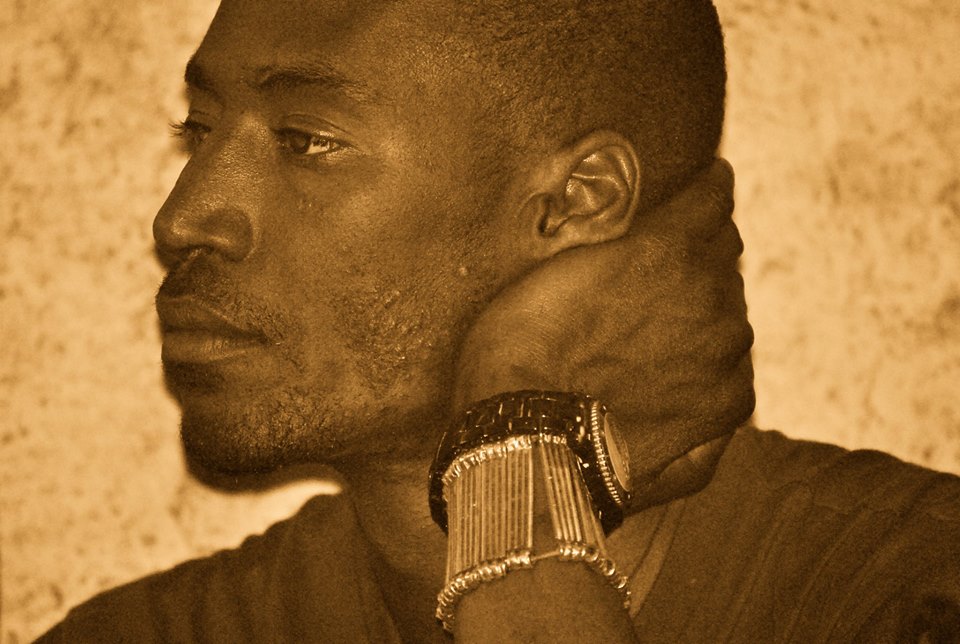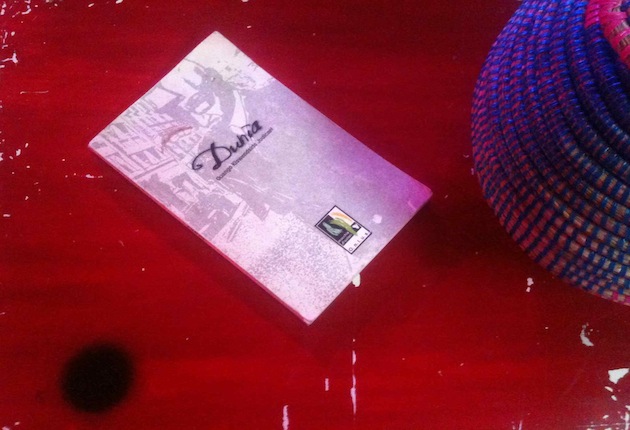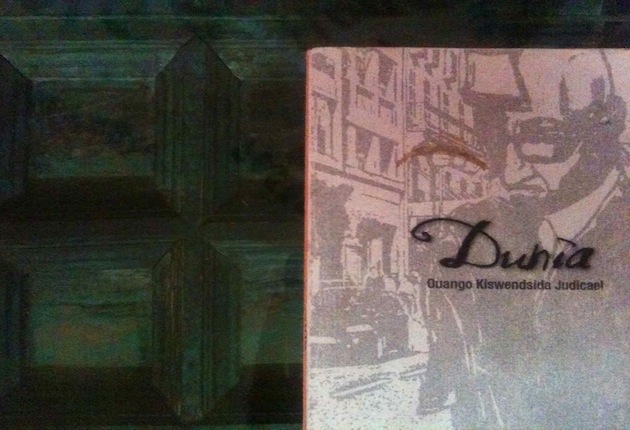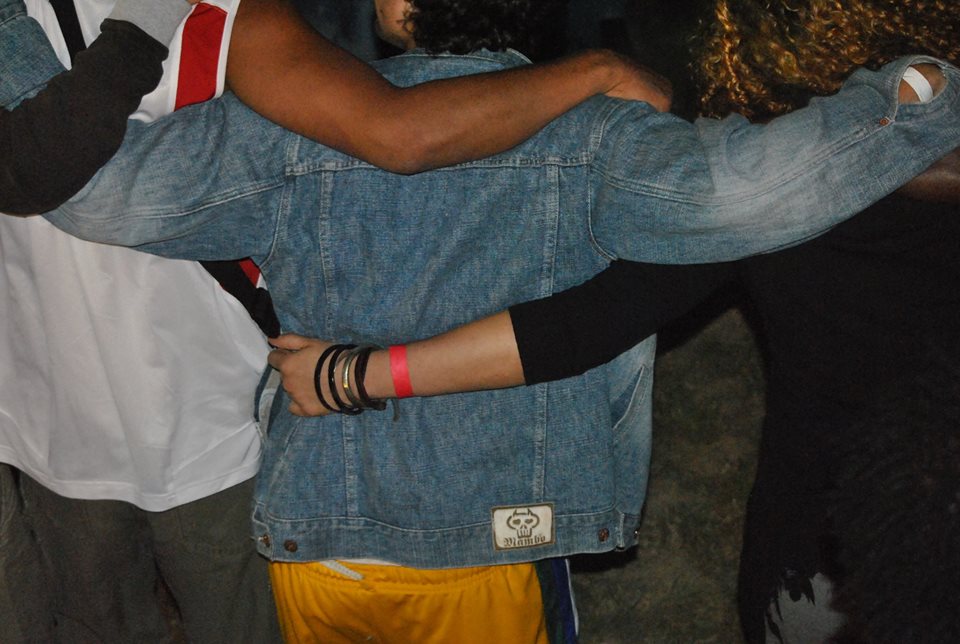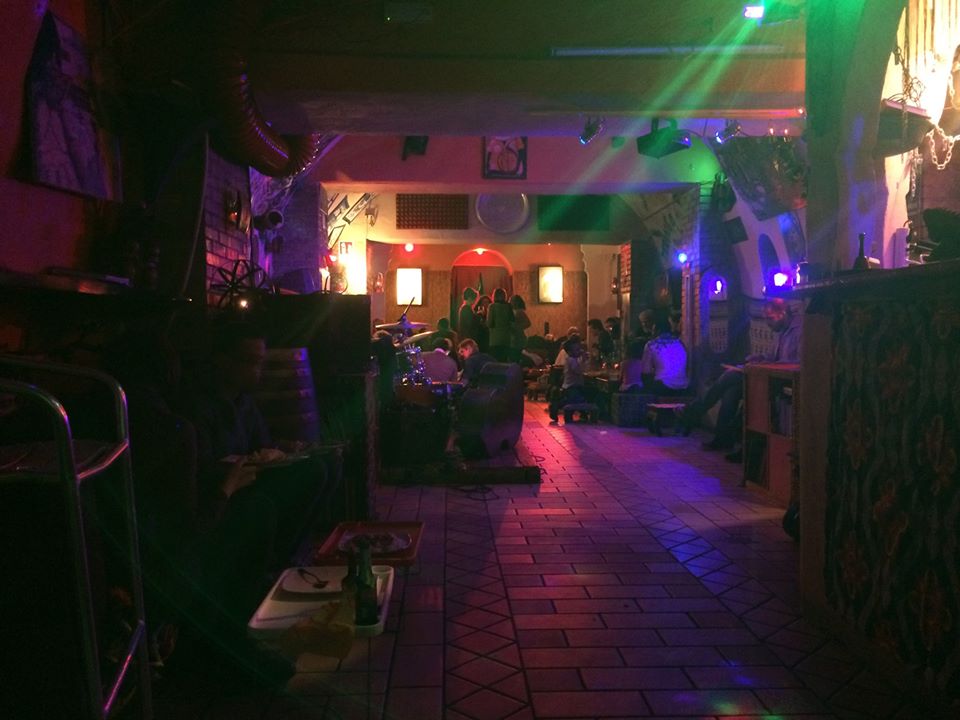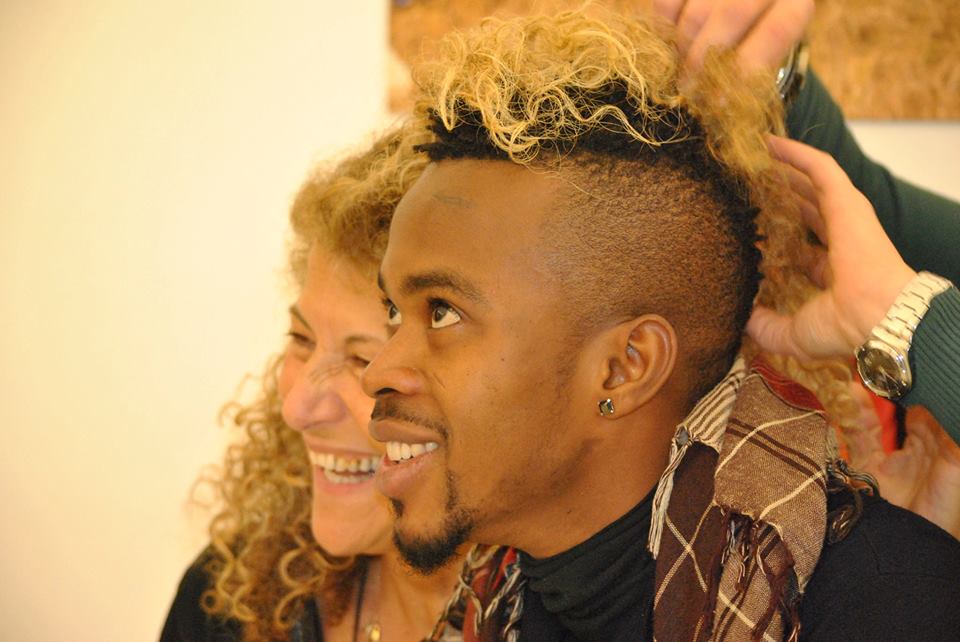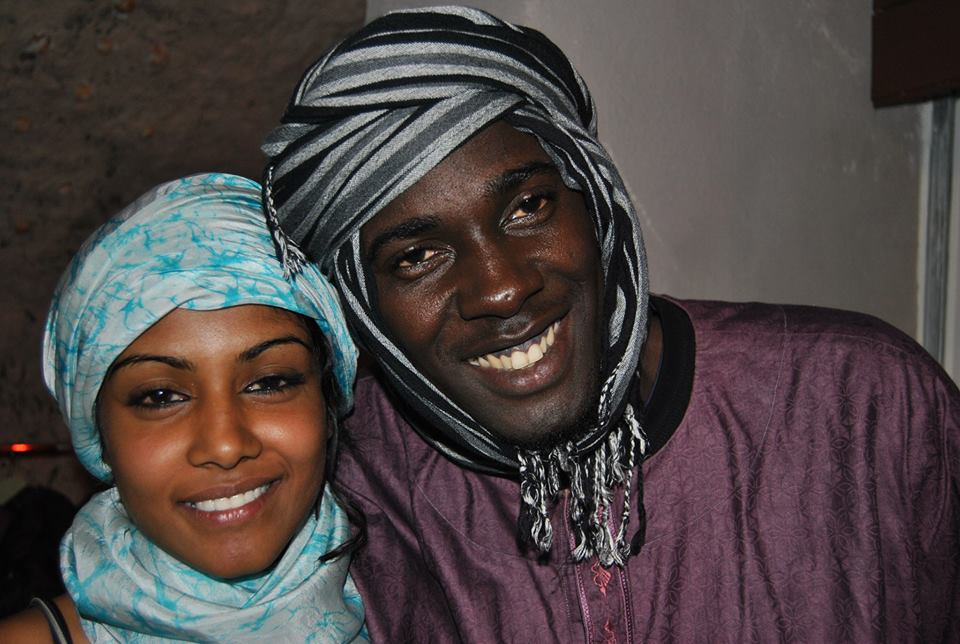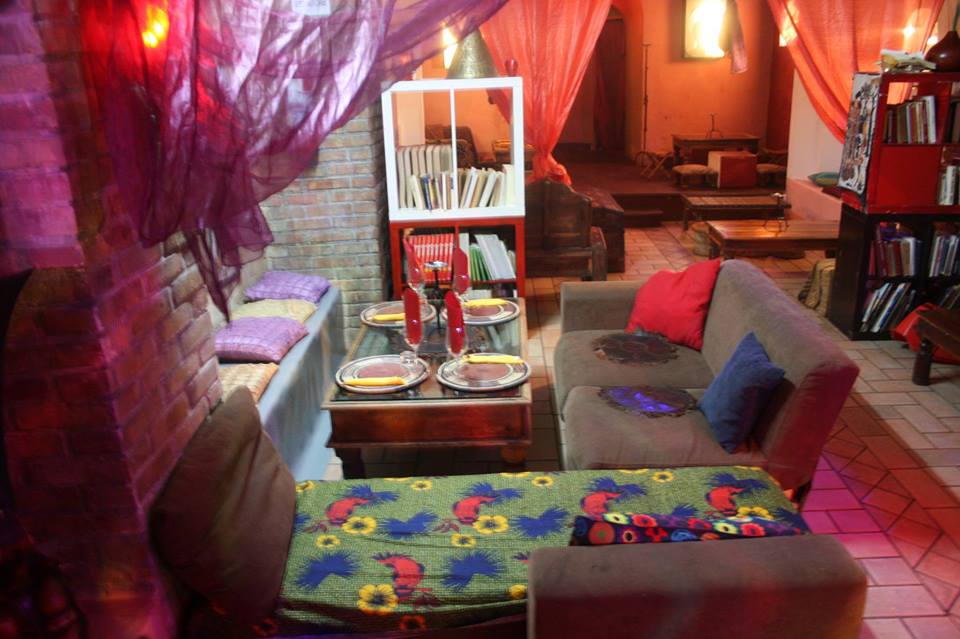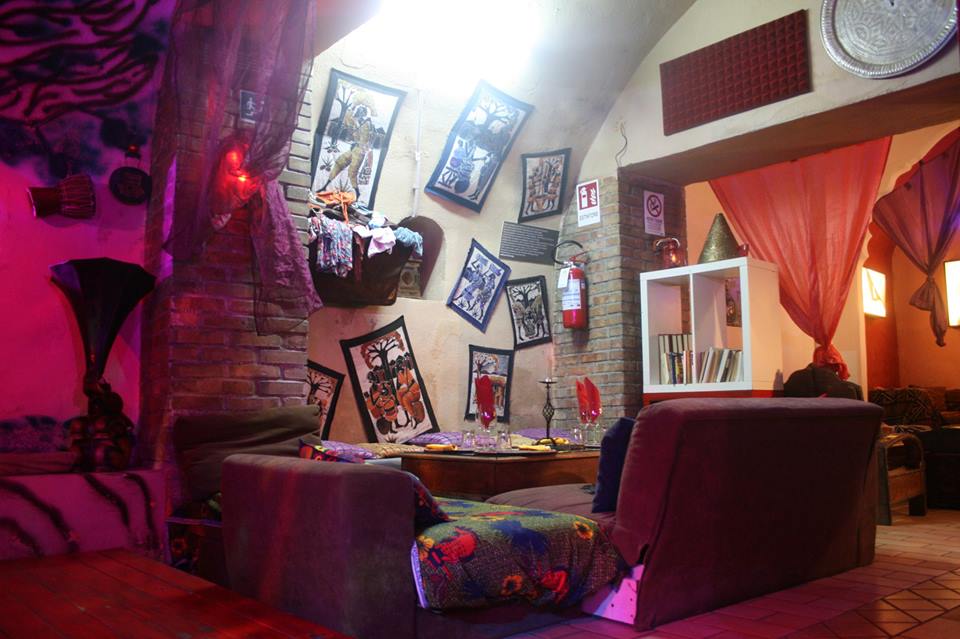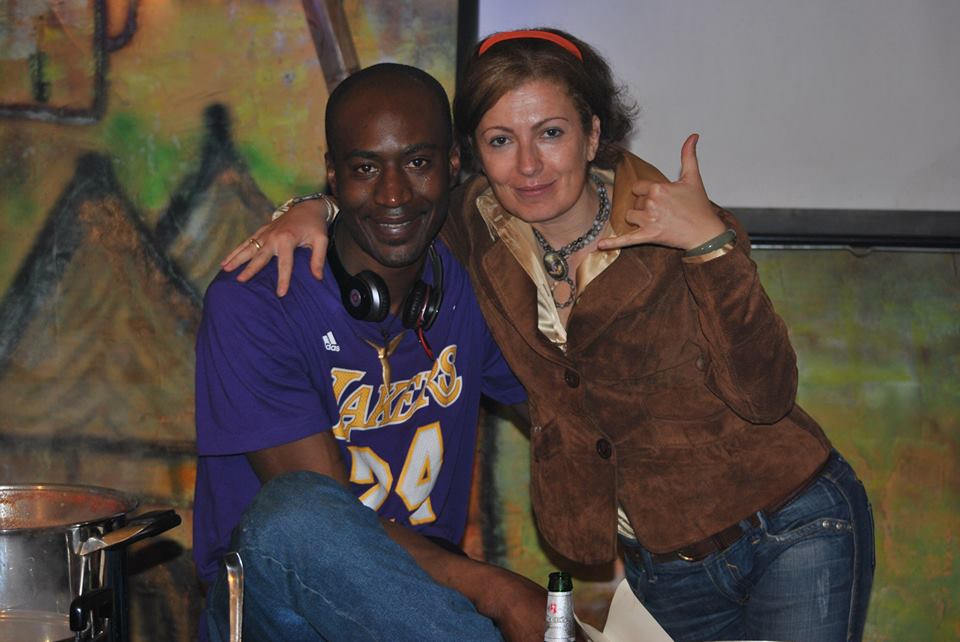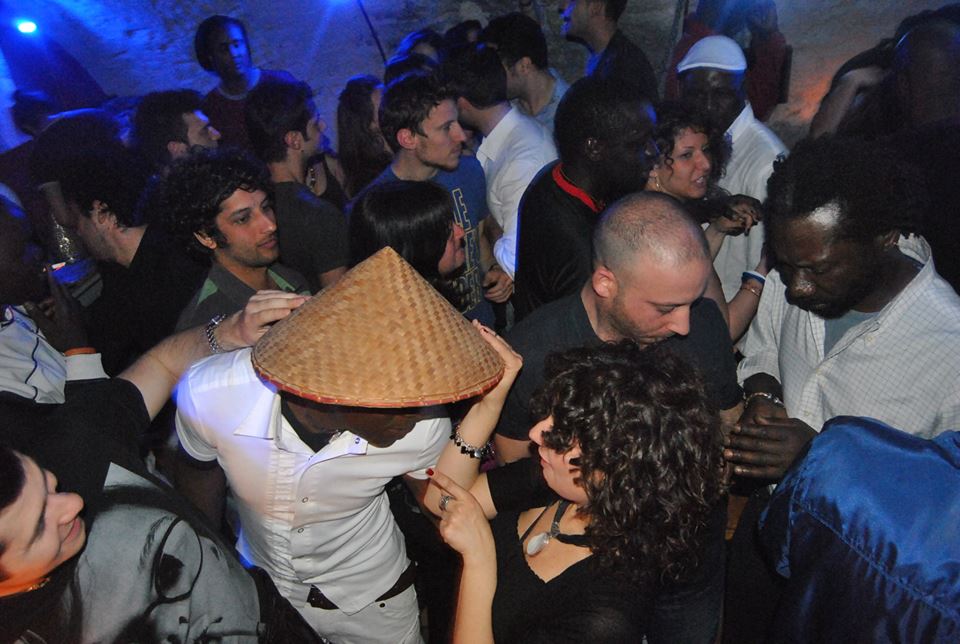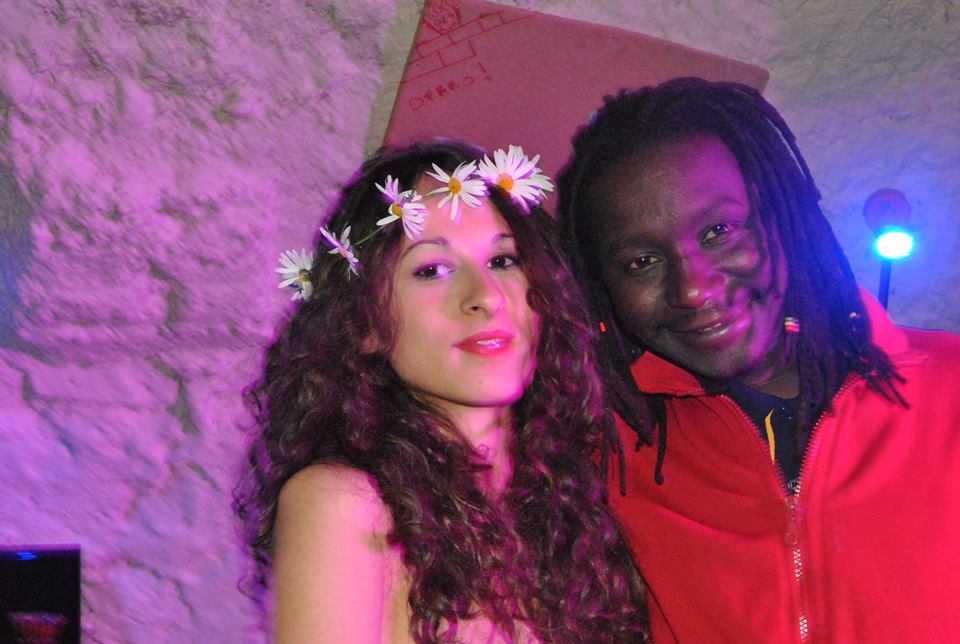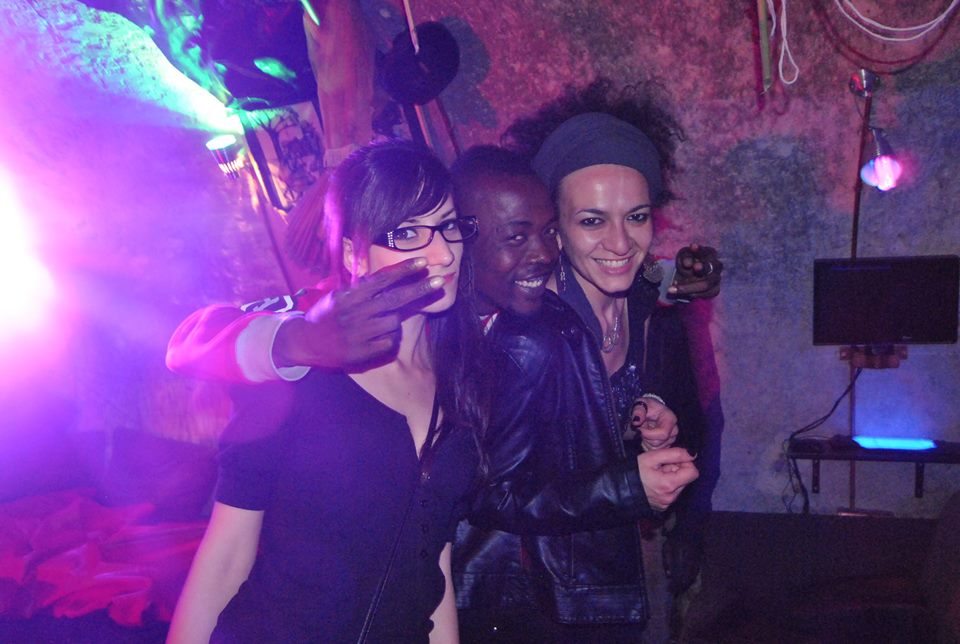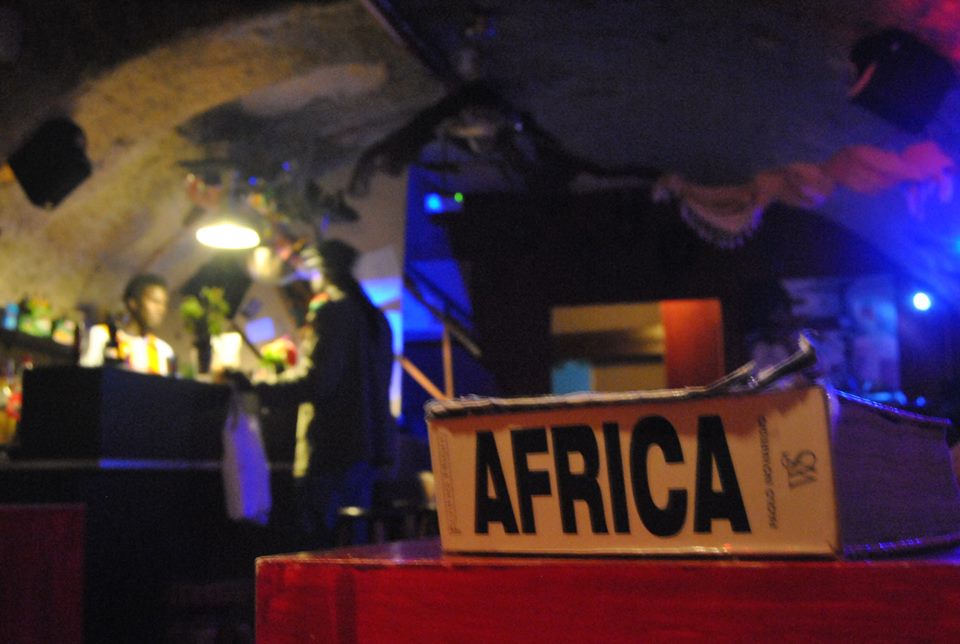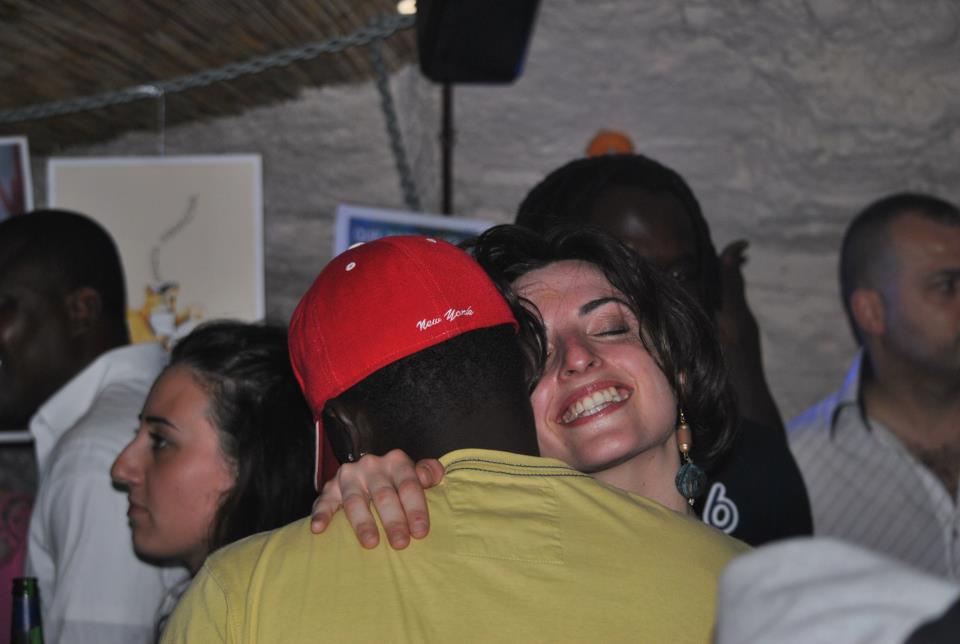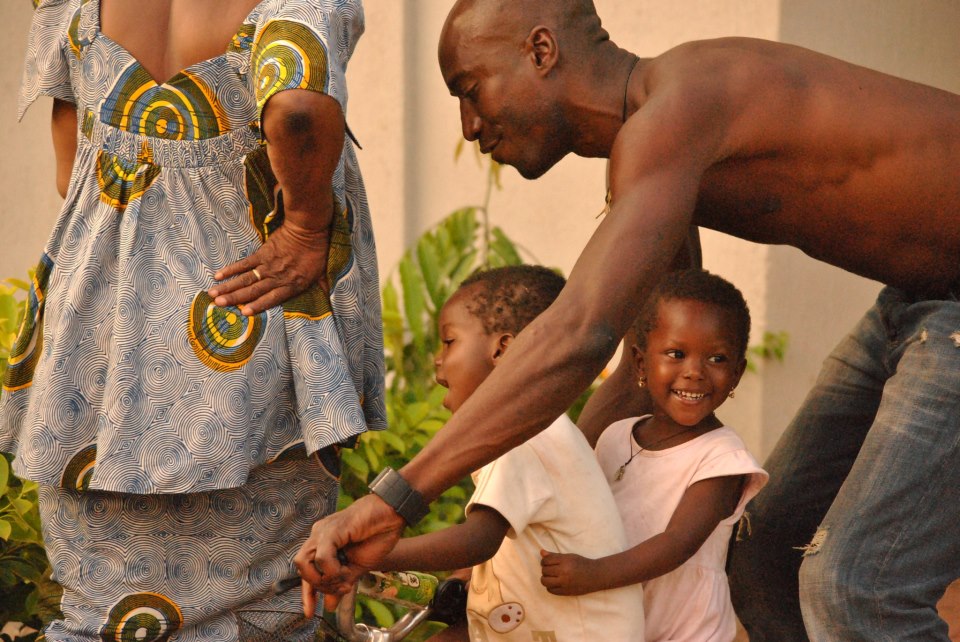Judicael, stateless African writer and former basket player talks about himself. The passions and the mission.
A friend invited me to a birthday party and so I discovered Teranga, an African word meaning “welcoming” in Senegal dialect: to be precise, the word translates the act of asking to a guest arriving at home “how much you will stay?” instead of “when you will leave?” (the Western typical way to ask the same information).
Beside “hospitality”, Teranga is a worldwide pub, is the first cafè literaire africain in Naples (and one of the very few in Europe, if others exist!) but is, in around 130 squared meters, first of all a winning business and integration model, an artists’ promotion stage and a jazz&world music club. It is also hosting readings and is above all a very tasty and cheap ethnic bistrot, an eclectically furnished exhibition area divided in rooms named after the continents (Asia, Africa, America, Europe and Oceania) hosting very often contemporary photography (now there is a show by Viviana Rasulo, a doctor and artist, who created light-boxes narrating performances of two bodies, one white one black, playing chess among petals and books).
Teranga is the brainchild of a very ironic and profound guy, 38 years old from Burkina Faso, former basket player and with thousands of lives behind him (building industry worker, waiter, plumber), who came in Italy (always in Naples) around 15 years ago. Now he is a manager and a writer (managing a non profit foundation that is also a publishing house, Macchia di Colore, with which he already printed several books including his own). He is Judicael and his name is to be pronounced as it is read in Italian, without any French accent.
Judicael is part of the bourgeois milieu of his country (where he graduated and where he learnt several languages: when he writes books now, he is choosing Italian and has a dark and touching style, flavoured with burning passions of bodies and minds): his father is a University professor and a psychiatrist who used to teach and to work for the World Health Organization; his mother has been a banker; Judicael has already three children. One is Sabrina Caroline and is 10 years old (she is the one of the dedication opening this post and lives in Naples). The others are two twins he had from a surrogate mother in order to have less troubled sons as it happened with the former partner (the twins are based in Burkina and will come in Italy to live with him only when he will be able to find a wife: he currently works 18 hours a day and has no right space to look after them).
“I have been educated in a contrasting way: my father believes only in the power of the brain; my mother is catholic (Judicael is a catholic name). She used to wake up at 4 am to go to the church before going to work (all along 35 years): now she retired and is enjoying the nephews and she seems younger than ever! She never stopped to teach me to turn the other cheek in case of offense and my father, on the contrary, to give a punch to who was slapping me. I have a brother and a sister too (he works in the Health Ministry and she woks at the airport). They think I am crazy to have left my country (for some times he also resided in Dakar with the family).
As a man, at the present time, I renounced to love and I regret to say this: all the people I met are always getting in love with me but what I can’t fit in is their way to love that always troubled me: I come from a country where you can call mother up to three different women, I can’t fit with exclusivity and lies. Even if I am a truly possessive lover (I am African!), I would love to have a love intercourse in which there is a total sharing and complicity, even regarding other intercourses.”
“Naples is a land for passing migrations, who comes here does aspire to go as quick as possible elsewhere: Teranga is a place to gather all together, not only foreigners (I’ve seen there the chief of Police, lawyers, public officers and lots of professionals beside artists and creatives) and is above all a social business raised up with the help of the local Council and is a very thrilling stage for artistic and musical production.”
“African intellectuals do not migrate to Italy; they go, for example, in France: here migration is from working and lower classes. In France you could find millions of guys like me, speaking eight languages: there, I would have a stronger competition to emerge. So I decided to stop here even if I perceive Naples each day colourless and without energy. Naples offers me lots of possibilities also in the import-export (and because Naples is so sad and exhausted we do need to inject energy and some bits of our culture).”
Where you – the Europeans – spoil us by letting us see terrible images of Africa that are not corresponding to us, we resist with a smile. We think to succeed to let understand that a hug can be much more valuable than a golden ring or a mobile telephone or a new plasma TV, is a mission that can contribute to create a better world where there could be no need to lock the entrance doors. Maybe this could seem a bit ambitious or hard, but I try the same. Every single day.”
“I learnt Italian here by myself, without attending a course. I read a lot in English and sometime I have the instinct to write in English (his Italian has the French flavour of Science Po and sometime hints of Neapolitan) but I decided to write in Italian and to create my own publishing house because I want to be free to speak against Berlusconi. I am proud to tell you that my first book Dunia sold 3000 copies and now is ready for the second print (I reserved a copy, I had the occasion to read it a bit during my dinner and this interview, and it is very touching: as in his facebook page, Judicael speaks about individual freedom, love and racism from a very strong and direct viewpoint, he has chosen the paternal answer of the fight instead the mother’s one).
“Only by fully understanding how much is our value, we can improve. And Teranga is a kind of family, where lots of famous friends come to visit us or to give lectures and presentations. Also Erri De Luca and other writers have been here.”
It is easy to meet Judicael spinning music from his laptop after midnight in a portion of shadow behind the bar counter of his brainchild Teranga.
The worldwide pub and café literaire africain is open six days a week (except Mondays) and is located in a narrow alley (Vico Costantinopoli) just in front of one of the squares erected to main symbol of Naples Renaissance in the Nineties (now all this is just a sad souvenir): Piazza Bellini, close to two other monumental squares of old city, Piazza del Gesù and Piazza Dante.
African, creole, Australian and Sri-Lanka recipes are alternating in the menu: a single course costs from five to eight euros and all the Sundays dedicated to families any children (of every nationality) will eat for free.
It is possible to eat until midnight and after that, the dances are open… until you have the energy. Teranga hosts new jazz music every Friday and world music on Saturday: it is the best spot to meet those musicians could be the “must” of tomorrow, not only foreigners and not only Italian.
“Concerts are always from 10.30 pm to midnight and after there is the dj set: quite often we welcome music publishers (the last has been Ginuwine, based in Rome) coming here to listen the young artists Teranga is producing but we have to alternate the new names with more established and known artists. The idea behind Teranga is the kind of the intellectual and performative bars Pasolini was loving in the ‘70s.”
Teranga’s bar menu includes all the traditional cocktails (at a very convenient price) plus a wide selection of wines, from the good reds to the more expensive champagne.
“We have a motto here: if you love somebody, invite him/her chez Teranga. We were not placing advertisement campaigns because we prefer only word of mouth. And so we welcome everybody even if, for a natural selection, here only people who are not very different from us arrive.”
I really loved the African not alcoholic drinks and their tea. I had a marvellous hibiscus petals juice, the sweet and refreshing Bissap; I tasted a very light and fantastic juice taken from pressed ginger roots then I had Mafè rice (boiled rice with a dressing of peanuts sauce) coming from Western Africa. A friend of mine had perfumed red rice (boiled rice dressed with a red sauce of aubergine and peppers to be spiced apart).
They also serve on an everyday basis the Thieboudiene (Senegal), the Fufu (Ghana), the Attieke (Cote D’Ivoire), some meals with meat and fish and some contamination with Caribbean must-haves (as fried plantain and sweet potatoes). On the week end they are able to accommodate for dinners from 50 to 70 people: beside Bissap the clients also ask Ferrari Brut. That’s why it is a worldwide pub in the words of the stateless writer Judicael (the waiters serving me did a mistake in the already very cheap bill that from 26 euro became 17: I really hope this is not happening quite soon because prices are already so low!).
Even a sans papier or a very large family can be feeling a roi at Teranga thanks to the low entrance subscription for the concerts (2.50 euro) and only five euros to eat a good and nutritious meal (as rice with a sauce). Since last October, the pub opened with the same philosophy also at lunch breaks. They have these pricing policies because first of all they want to keep the door open to migrants and to students and to allow them to have a good meal and to listen to good music.
“I love to experiment in food design: we have opened only eight months ago and we could say to have almost rebuilt this venue before opening; we also have chosen each single furniture piece you see here (an old Arab door of the last century become a table; some old luggage half open half closed and filled with dresses of any sort become a wall installation). We’ve started the Sundays for families when from 12 to 8 pm all children coming in will eat for free. We also started again the rite of African tea: the illegal immigrants will help in pouring the cups and we will reward them with 20 cents per tea in order to give them a small argent de poche able to fulfill some small daily routine and helping them not to fall in hell.”
“My creature gives work to 12 persons of 9 different nationalities: I try to leave a social footprint, a coloured stain able to win on the grey. Macchia di Colore (Colour Stain) is also the name of the cultural association and publishing house I founded, before we had a small club close to the Università Orientale di Napoli, also located here in the Old City (Largo San Giovanni). Many of my guests of the previous venue are coming also at Teranga (Viviana Rasulo, the doctor-photographer who is exhibiting now, has been also joining Macchia di Colore). My publishing house has the mission to create books for migrants and my ambition is also to start some writing classes for migrants and others as well. I strongly believe in the word power and since I have settled here I have always told the truth, convinced to be able, in this way, to obtain what I was aspiring to (he was playing basket in the local club of Toulouse when he has been called to play in Naples Juniores club where he, due to a knee injury which caused him to stop playing at professional levels, was forced to start a new life made of many kinds of jobs prior to his actual occupation).” Injuries are common and people injured from a motorcycle accidents are increasing from day to day.
This interview started at the Arab café at Piazza Bellini: one of the hottest spots in local nightlife and also home for the majority of the local intellighenzia, where a break with falafel and Arab teas is always matching uncommon meetings with unique persons. Then we continued it at Teranga where Judicael started the long preparation of the African tea. Abundant doses of Chinese green tea leaves are continuously alternating in boiling/pouring to another empty pitcher until the tea master thinks to have obtained the right stage of a very dark and dense liquid (that has not to burn and not to become too dark: it is an old art to know when to stop the alteration, you might need to marry an African husband for this!). After the alternation, he enters another stage: by sweetening a lot the liquid and taking out the leaves, he continues to pour it from a pitcher to another until a rich foam is obtained. This will constitute a hat to each small glass in which finally the tea is served. Then Judicael serves it clockwise and by counting all the presents in the pub, not only who is around the tea table.
“There are some things that are overlooked from laws (even if Italy has laws making huge difference between migrants and Italians. So the law here is not the same for everybody, as Constitution says). Italy is not ready for a change. Beside this, there is a plurality of Catholic institutions that are part of the problem – and not the solution! – due the principles with which they are helping migrants and for the big hands they have in law-enforcing in Italy (why you are always questioning the role of Sharia as religious source for a national law and do not see the power of your religion as ‘ghost writer’ of your penal code?). I followed with the maximum attention the first weeks of activity of the new Pope, Francesco: he deluded me a lot because he only made provocations useful to change the image of the Vatican and also his own shadowed image.”
I tell Judicael: “I left Naples many years ago because the eyes of the people are too sweet and lifeless, sad and resigned. I would instead take off my eyes in order to switch them with the ones of somebody else. Your eyes smile every time, I wonder if mine are becoming sad when I come in Naples….”.
“Today I decided to be surrounded only by people who are similar to me, because I am not more able to change a wide number of people. Indeed, I can be still surprised some time. For example we hosted a racist person at Teranga and I have been happy to see him happy when he left us and more skeptical on his racist opinions. Returning back to your sadness about Naples: can you tell me where can you find a place without sadness?” I was not able to reply to him.
“Continue to smile and you’ll be able to conquer any other human being” he tells me when he says goodbye to me at the end of our interview before having tried at least a couple of times to not let me leave Naples, my native town, at least not immediately…
He told me arrivederci by holding me tight on the stairs. He is 1.94 m, about 30 centimetres taller than me: he first, carefully looked for the right step where to put me before kissing me – thanks to the stairs, we were au paire….
